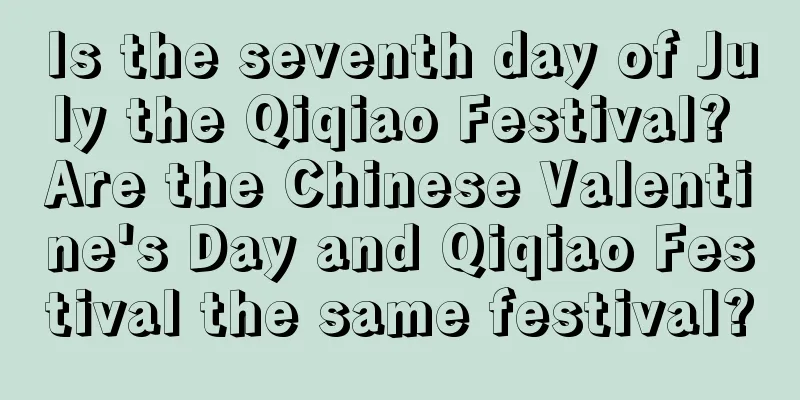Is the seventh day of July the Qiqiao Festival? Are the Chinese Valentine's Day and Qiqiao Festival the same festival?

The seventh day of July is the Chinese Valentine's Day, one of China's traditional festivals. So is the seventh day of July the Qiqiao Festival? Are the Chinese Valentine's Day and the Qiqiao Festival the same festival? July is also known as the Qiao Month, the Gua Month, the Orchid Autumn, the Zhao Autumn, the New Autumn, the First Autumn, the Xiang Month, the Meng Autumn, and the Early Autumn. Come join us at Shuimoxiansheng.com to appreciate the beauty of the seventh lunar month of 2019!Is the seventh day of July the Qiqiao Festival?Answer: The seventh day of July every year is the Chinese Valentine's Day, also known as the Qiqiao Festival.The Qiqiao Festival is also commonly known as the Chinese Valentine's Day. According to legend, on the night of the seventh or sixth day of the seventh lunar month, women would beg the Weaver Girl for wisdom and ingenuity in the courtyard, hence the name "begging for cleverness." It originated from the worship of nature and women threading needles to pray for dexterity, and was later endowed with the legend of the Cowherd and the Weaver Girl, making it one of the most romantic festivals. The seventh day of the seventh lunar month is the birthday of the Seventh Sister, also known as the Weaver Girl. Worshiping the Seventh Sister to pray for blessings and beg for cleverness is one of the important customs of the Qixi Festival. According to folk legend, the Seventh Sister is an expert weaver from heaven. In the old days, women would "beg for skill" from the Seventh Sister, asking her to teach them a skill that was clever and dexterous; in fact, the so-called "begging for skill" was nothing more than a "competition of skill." Because "begging for cleverness" is an important custom of the Seventh Sister's Birthday, it is also called the "Begging for Cleverness Festival." Are the Chinese Valentine's Day and the Qiqiao Festival the same festival?Answer: The Chinese Valentine's Day is the Qiqiao Festival, which is one of the nicknames of the Chinese Valentine's Day.The Chinese Valentine's Day, also known as the Qiqiao Festival, originated in the Han Dynasty. In the Western Capital Miscellaneous Records by Ge Hong of the Eastern Jin Dynasty, there is a record that "beautiful women of the Han Dynasty used to thread seven-hole needles in the Kaijin Tower on July 7th, and everyone was accustomed to it." The original Qiqiao Festival was not to commemorate the love between the Cowherd and the Weaver Girl, but to commemorate the Weaver Girl herself, who was called "Seventh Sister" by the people. Therefore, the Chinese Valentine's Day is first and foremost a women's festival, and the Weaver Girl is regarded as the goddess of weaving and the object of worship for women in ancient times. On the night of the seventh day of the seventh month, mortal women would beg her for wisdom and skills, and of course, they would also pray for a happy marriage and a husband of their dreams. According to the "Dongjing Sui Shi Lu", "On the Qixi Festival, every family decorates with colorful decorations to make a begging tent." This shows how grand the occasion was. The activity of "begging for wisdom and skill" is actually begging for wisdom and skill from the Weaver Girl. The custom of begging for dexterity has already existed in the Han Dynasty. During the Northern and Southern Dynasties, women tied colorful threads and threaded seven-hole needles. This custom was particularly popular in the Tang Dynasty. People would use needle throwing to predict dexterity. They would take a bowl of clean water and expose it to the sun. Then they would throw a small needle to float on the water. The shape of the needle's shadow on the bottom of the water would be used to predict whether the woman was smart or stupid. During the Ming and Qing Dynasties, the Qixi Festival evolved into the "Seven Girls Gathering", where seven girls would get together and use paper, colored paper, rice and flour as materials to wrap various flowers, fruits, figures, and palace utensils. They would then be displayed on the Eight Immortals Table in the courtyard on the evening of the Qixi Festival for tourists to appreciate, and then they would compete in threading needles and worship the Weaver Girl. As the saying goes, "A good fate is not as good as good luck." A person's destiny is already determined, and the only thing that can be controlled is his or her "luck." Unexpected changes in the world may happen at any time, so use Mr. Shui Mo's [Premium Calculation] function to learn more about your fortune in 2019! |
>>: Where is the direction of the God of Happiness on the 15th day of the sixth lunar month in 2019?
Recommend
What is the fortune of the five elements on Chinese Valentine's Day on August 4, 2022, and how to dress auspiciously?
Every time the Chinese Valentine's Day comes, ...
What is the lunar calendar for the sixth day of the twelfth lunar month in 2020? Is it a good day?
In addition to the twelfth month of the lunar cal...
Can I set up my bed on the fifth day of the seventh lunar month in 2022? Is it a good day?
The seventh month of the lunar calendar is the fir...
Is it a good idea to give birth to a girl on the second day of the eleventh lunar month in 2017?
China is a traditional country, so it is particula...
Is it a good idea to get engaged on January 4, the day before Xiaohan in 2021? Auspicious date for engagement in January 2021
Introduction: It is generally necessary to choose ...
Why can’t we go back to our parents’ home on Double Ninth Festival? What is the Double Ninth Festival also called?
There are many folk activities and festival taboos...
Can I get married on Christmas Eve 2019? What does it mean to give apples on Christmas Eve?
Christmas Eve is on December 24th every year, and ...
Will it rain during the Grain Full solar term in 2019? Is there any explanation for the rain during the Grain Full solar term?
Introduction: Grain Full is the second solar term ...
What is the fate of those born in the Year of the Rat during the Xiaoxue solar term? How is your fortune in 2020?
Although 2020 is about to pass, some people are st...
What are the missing five elements of a baby rat born one day after the Lantern Festival on the 16th day of the first lunar month in 2020, and what is his fate?
Introduction: Although everyone cannot choose the ...
Is it good for people born in the Year of the Pig on Qingming Festival in 2019? Will they have a good life if they are born on Ghost Festival?
Qingming Festival is one of the three traditional ...
How is the seventh day of the eighth lunar month in 2017? Is it a good idea to start renovation?
Introduction: Nowadays, people are paying more and...
Is it okay to worship ancestors on the seventh day of the seventh lunar month in 2021? What should we pay attention to?
Worshiping our ancestors is our duty as descendant...
Is June 1, 2019, Children's Day, an auspicious day for a funeral? Is it auspicious to hold a funeral today?
Introduction: Funeral is also a major event, so an...
Can I get married on the 13th day of the sixth lunar month in 2018?
Want to know more about the dates and auspicious ...

![Check the luck and inauspiciousness of [travel] on September 22, 2021 in the lunar calendar. Is it an auspicious day?](/upload/images/67ca1830c2a96.webp)







